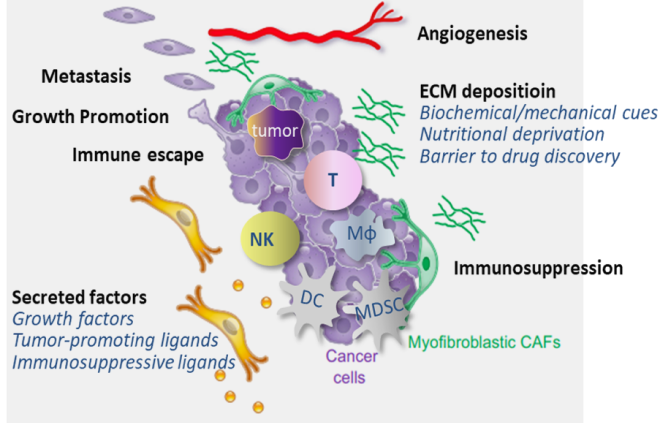Oncology
Tumors arise in a complex and dynamic microenvironment that influences growth, invasion, and metastasis.
Based on this understanding, we focused on the major signaling pathways that affect tumor cells, immune cells, and the stroma that comprise the tumor microenvironment.

Our approaches
- Exploring novel drug targets based on the understanding of the tumor microenvironment
- Choosing the right therapeutic modality
Ongoing Programs
Dong-A ST’s current oncology program covers the kynurenine pathway, T-cell receptor signaling,
immune checkpoint receptor signaling, oncogenic signaling, DNA damage response, and drug resistance.
Among them, the immuno-oncology programs are the most advanced,
and their most advantageous trait is that they are small-molecule drugs that protect or reverse T-cell dysfunction and activate other immune cells.
We anticipate that they could combine with or further substitute current immunotherapies.
| Program | Target / Pathway | Stage | Modality |
| Immuno-oncology | |||
| DA-4505 | AHR | IND enabling | SM |
| DA-4507 | GCN2 | Lead op. | SM |
| DA-4511 | TCR/ICR* signaling | Lead op. | SM |
| Discovery 1 | IFN-I boosting | Biological | SM |
| Oncology | |||
| DA-4515 | TEAD | Lead op. | SM |
| Discovery 2 | DDR** signaling | Hit-2-Lead | SM |
| Discovery 3 | Undisclosed | Hit-2-Lead | TPD |
| TME modulation | |||
| DA-3101 | aFAP x IL-12v | Cell line dev. | Bispecific mAb |
- *TCR : T cell receptor, ICR : Immune checkpoint receptor
- **DDR : DNA damage response


